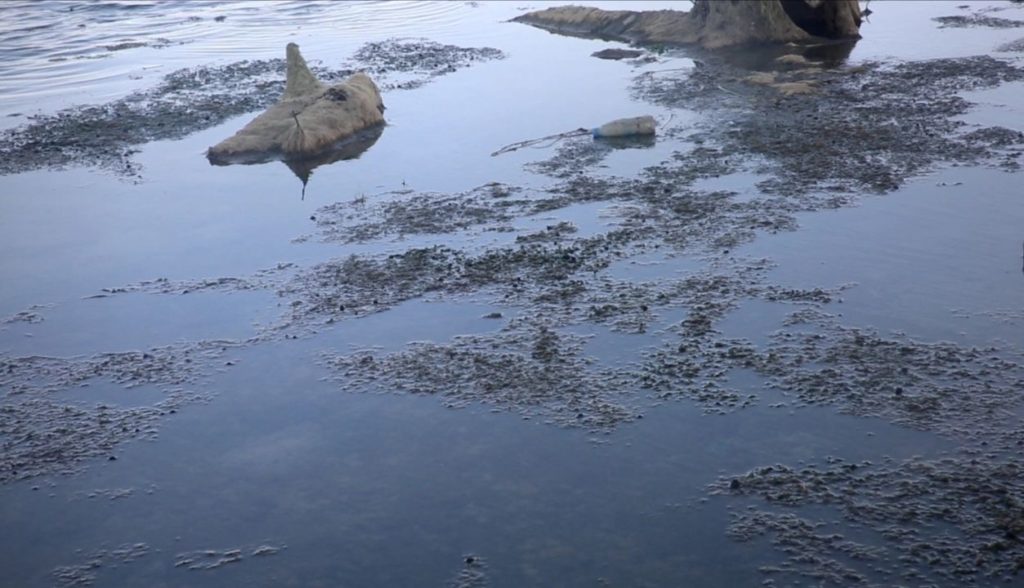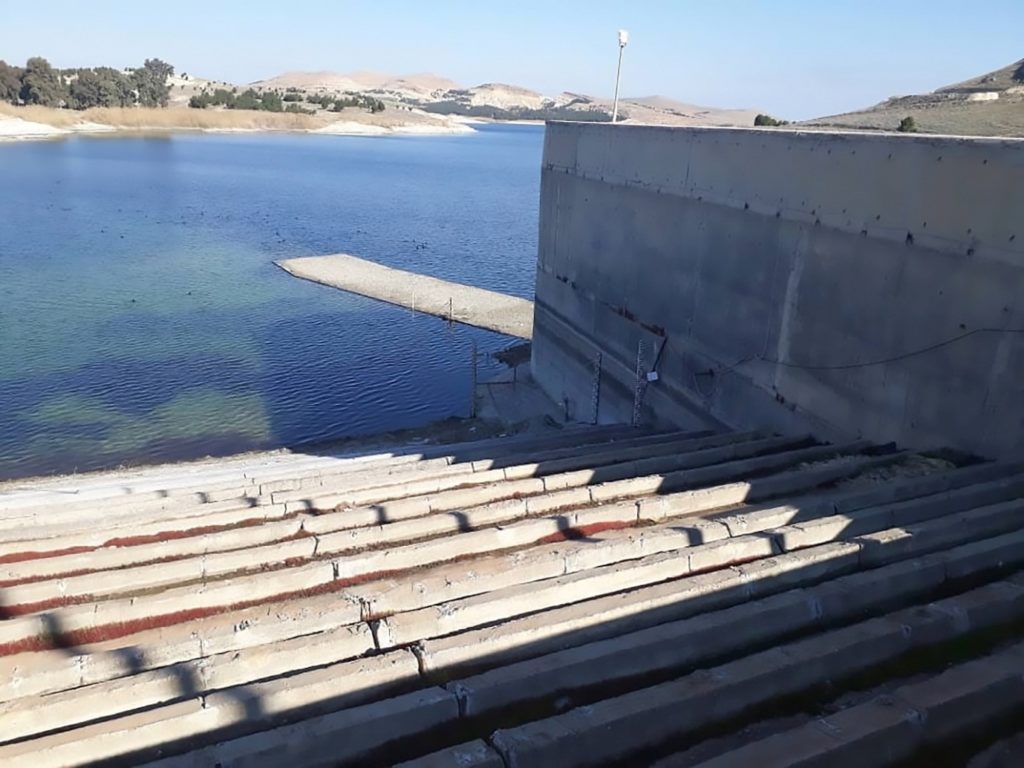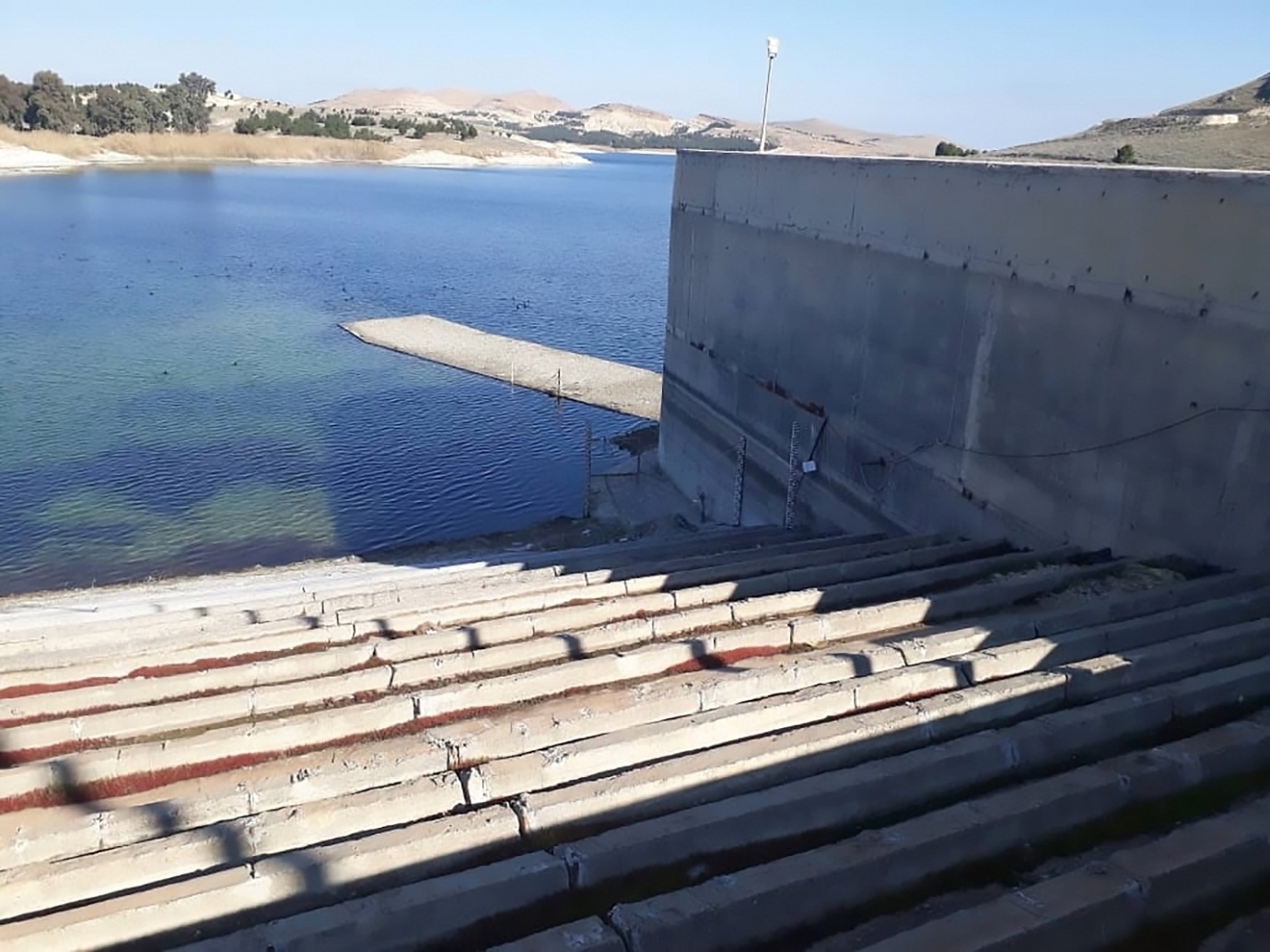متوفر باللغة العربية أيضاً
Bi Kurdî jî peyda dibe
Soulnar Mohammad
This publication was produced with the financial support of the European Union. Its contents are the sole responsibility of Soulnar Mohammad who prepared this material in the favor of the partnership between Nextep Organization and Welat FM and do not necessarily reflect the views of the European Union.
“We noticed pallor under my mother’s eyes, with her feeling of severe flank pain. Day after day, her health began to deteriorate. And after consulting a specialist, it became clear that the reason was her drinking contaminated water.” Not only Reem Al-Salama’s (32 years) mother from the city of Raqqa in northeastern Syria was suffering, but some other members of her family, especially children, were affected due to the low level of the Euphrates River and the use of stagnant water.
The water level of the Euphrates River, which originates in Turkey and flows through Syria and Iraq, has been declining since January 2021 as many experts and humanitarian organizations have warned of a humanitarian catastrophe if the river level continues to recede and the resulting threat to the lives of millions of residents.
Reem says that the low level of the Euphrates water forced her to use groundwater, and even though it is also polluted, the rate of pollution in it is less than that of the river water. Others resorted to drinking sterilized mineral water. However, the continuity of the problem makes it unaffordable for people to buy constantly due to their economic situation.
Ali Al-Hamoud (37 years), from the village of Al-Ratla in the countryside of Raqqa, has become suffering from intestinal problems such as “colic,” “recurrent diarrhea,” and the formation of kidney stones as a result of the increase in the rate of impurities in the domestic drinking water, which prompted him to use intestines antiseptic drugs following the doctor’s instructions.
According to Ali, the amount of water reaching his house is very small as it is subject to the rationing system, which leads to the poor flow of the drinking water in the network. Accordingly, the rate of impurities and algae increases in the drinking water, thus increasing the chances of disease.

As for the proposed solutions, both Ali and Reem agreed on the necessity to develop sterilization methods in water pumps, and rehabilitate the old ones, in addition to digging “Infiltration wells” on the banks of the Euphrates in order to pump more pure drinking water to the population instead of drawing water directly from the river. This, in addition to the intensification of awareness campaigns aiming to rationalize water consumption.
In 1987, Syria signed a temporary agreement with Turkey guaranteeing its access to more than (500) cubic meters per second of the waters of the Euphrates River from the Turkish side. Then, in 1989, Syria submitted the agreement to the United Nations to guarantee its minimum share. However, two years ago, this amount decreased to (200) cubic meters per second, according to Sheikh Nabi Khalil, the head of the Operation and Irrigation Office of the Agriculture and Irrigation Committee in Raqqa (affiliated with the Autonomous Administration).
Exclusively to Walat FM, via WhatsApp, Sheikh Nabi Khalil accused Turkey of reducing Syria’s and Iraq’s share of the Euphrates River water, using it to leverage against the Autonomous Administration in North and Northeast Syria and waging wars against it by various means, including cutting off the internationally agreed amount of water, according to him.
The low level of the Euphrates River provided a suitable environment for the growth of harmful microbes and bacteria due to the poor water flow. It resulted in the spread of gastroenteritis accompanied by severe diarrhea, especially among children, at a rate of 70% of other cases, which ranges from moderate to severe, explained Khalil Al-Sheikh, the coordinator of medical organizations in the Health Committee of Raqqa (affiliated with the Autonomous Administration.

Amid the increasing number of people infected with diseases caused by water contamination, health centers in Raqqa suffer from a shortage of antibiotics, anti-emetics, and nutritional supplements needed for children, which are necessary for treating them from severe dehydration cases associated with the occurrence of diarrhea, Al-Sheikh added.
The Effect of the Decline of the Euphrates River on Agricultural Wealth
“The farmer’s relationship with the land is one of love and existence. We went through trying days with the decline of the Euphrates River. Every time I looked at my barren land, I felt as if one of my children was unwell, and I’m powerless to provide the treatment.” said the farmer Khalaf Al-Baalaw explaining to which end his agricultural land had come to due to the low level of the Euphrates River in the Raqqa region.
Al-Baalaw (47 years), a resident of the village of Al-Ratla in the Al-Shamiya area in the countryside of Raqqa, mentioned that as a result of the decline of the Euphrates River, he has stopped cultivating his 50-dunums land, two years ago, and that he failed in two attempts to dig groundwater well, which compelled him to use a well owned by a neighbor, but that also cost him exorbitant expenses that were not disproportionate with the crop production.
“We noticed pallor under my mother’s eyes, with her feeling of severe flank pain. Day after day, her health began to deteriorate. And after consulting a specialist, it became clear that the reason was her drinking contaminated water.” Not only Reem Al-Salama’s (32 years) mother from the city of Raqqa in northeastern Syria was suffering, but some other members of her family, especially children, were affected due to the low level of the Euphrates River and the use of stagnant water.
The water level of the Euphrates River, which originates in Turkey and flows through Syria and Iraq, has been declining since January 2021 as many experts and humanitarian organizations have warned of a humanitarian catastrophe if the river level continues to recede and the resulting threat to the lives of millions of residents.
Reem says that the low level of the Euphrates water forced her to use groundwater, and even though it is also polluted, the rate of pollution in it is less than that of the river water.
Others resorted to drinking sterilized mineral water. However, the continuity of the problem makes it unaffordable for people to buy constantly due to their economic situation.
Ali Al-Hamoud (37 years), from the village of Al-Ratla in the countryside of Raqqa, has become suffering from intestinal problems such as “colic,” “recurrent diarrhea,” and the formation of kidney stones as a result of the increase in the rate of impurities in the domestic drinking water, which prompted him to use intestines antiseptic drugs following the doctor’s instructions.
According to Al-Hamoud, the amount of water reaching his house is very small as it is subject to the rationing system, which leads to the poor flow of the drinking water in the network. Accordingly, the rate of impurities and algae increases in the drinking water, thus increasing the chances of disease.
In 1987, Syria signed a temporary agreement with Turkey guaranteeing its access to more than (500) cubic meters per second of the waters of the Euphrates River from the Turkish side. Then, in 1989, Syria submitted the agreement to the United Nations to guarantee its minimum share. However, two years ago, this amount decreased to (200) cubic meters per second, according to Sheikh Nabi Khalil, the head of the Operation and Irrigation Office of the Agriculture and Irrigation Committee in Raqqa (affiliated with the Autonomous Administration).
Exclusively to Walat FM, via WhatsApp, Sheikh Nabi Khalil accused Turkey of reducing Syria’s and Iraq’s share of the Euphrates River water, using it to leverage against the Autonomous Administration in North and Northeast Syria and waging wars against it by various means, including cutting off the internationally agreed amount of water, according to him.
The low level of the Euphrates River provided a suitable environment for the growth of harmful microbes and bacteria due to the poor water flow. It resulted in the spread of gastroenteritis accompanied by severe diarrhea, especially among children, at a rate of 70% of other cases, which ranges from moderate to severe, explained Khalil Al-Sheikh, the coordinator of medical organizations in the Health Committee of Raqqa (affiliated with the Autonomous Administration.
The Effect of the Decline of the Euphrates River on Agricultural Wealth.
During the last ten years, the level of the Euphrates River began to decline gradually as a result of climate change and the lack of precipitation, on the one hand, and Turkey’s reduction of Syria’s and Iraq’s share of the river water since two years, on the other hand, which directly affected the agricultural sector due to the water level has become lower than the level of irrigation stations, leading the farmers to resort to emergency solutions such as lengthening the water intake pipes and the retention of the river water to make it reach the level of the pumps established on the stations along the river, according to Al-Baalaw, who also explained that the decline of the river level affected the groundwater the farmers resorted to by digging wells, which added additional financial burden on them, due to their need to install diesel engines and extend irrigation networks to irrigate their lands.
According to “Albalaw,” as the Euphrates River has declined, farmers in the Raqqa region have begun planting winter crops that require less irrigation, such as wheat, at the expense of strategic crops such as cotton, corn, and summer vegetables, which require more irrigation due to the high temperatures combined with a lack of water, which harms the quality and productivity of these crops.
For his part, Sheikh Nabi Khalil has explained that the decline in the level of the Euphrates began in 2018, but the ratio of precipitation during 2019 was high and did not affect the work of the dams. He added that during the years 2020-2021-2022, The river level has returned to a significant decline, as the level of the Tishreen dam has reduced to less than (7) meters, and the Tabqa dam to less than (5) meters. This decline directly affected the work of dams in terms of a decline in their capacity to generate electric power and draw water to irrigate agricultural lands, in addition to water contamination that led to the spread of diseases among the population, according to Khalil.
Khalil added that the storage capacity of the Tishreen Dam before 2011 was one billion and 900 million cubic meters, now it has decreased to one billion cubic meters. As for the water stored in the Tabqa dam, it has decreased from 14 billion and 160 million cubic meters to 11 billion cubic meters, and the irrigated areas dropped from 93 thousand hectares to 79 thousand hectares.
Among the efforts made by the Employment and Irrigation Office to mitigate the effects of water shortages, Khalil emphasized their implementation of an agricultural plan and their activation of scientific research for the cultivation of thirst-tolerant crops, especially winter ones, to benefit from rainwater in addition to communicating with the local councils to explain the water crisis to rationalize its use, as well as, the adoption of modern irrigation methods played a role in saving 50% of the amount of water.
Livestock: The worst affected by the water crisis
Even though it is his ancestral profession, Muhammad Al-Ibrahim 56, is considering changing his profession in livestock due to the low level of the Euphrates River, which affected the availability of the pasture and water for his flock of sheep.
“I am considering selling all my flock and looking for another source of livelihood. It is because of the low prices of livestock and the high costs of buying tankers’ water for watering. What makes me hesitate to take this step is that I’m not proficient in another profession, on the one hand, and because it is the hereditary one in my family on the other hand.” Al-Ibrahim says

Al-Ibrahim, a displaced person from Homs Province who now lives in the Karama area of Raqqa’s eastern countryside, went from place to place seeking pasture and water for his sheep, which harmed him financially as he is providing for 14 people.
Alibrahim’s sheep were infected with Pasteurellosis, a contagious bacterial respiratory disease that appears in the form of blood poisoning or pneumonia. The water crisis exacerbated the disease, as now he became dependent on tankers’ water for watering his flock, and due to the late arrival of water tankers until the evening hours, this led to the mortality of five of them.
The situation is not different for Ahmad Al-Khalaf, 43, a sheep breeder from the village of Al-Sahal in the southern countryside of Raqqa. He, in turn, depends on both well and tanker water for watering his sheep. However, many diseases have spread among his flock, including a disease called “Abu Rafish” caused by polluted water. The symptoms of this disease appear as infections in the intestines of the sheep ending up in their mortality; more than 25 sheep were infected with this disease, which led to the mortality of 18 of them.
Within two years, the number Al-Khalaf’s sheep decreased from 400 to 150 because he was forced to sell some of them to buy fodder for the rest of the flock, in light of the lack of the natural pasture areas, especially those adjacent to the Euphrates River.
The livestock breeders demanded the responsible authorities and relevant organizations dig wells, provide mobile water tankers in Badia (the countryside), and provide adequate support for livestock breeders, in addition to providing free or at least reduced-cost vaccinations.
For his part, the vice-co-president Committee of Agriculture and Irrigation, and the supervisor of livestock in Raqqa, Mounthir Rifat Al-Salih, ascribed the reason for the deterioration of livestock conditions to the high price of fodder and fodder supplements, denying that it is affected by the low level of the Euphrates River, as livestock breeders depend on water tankers and agricultural irrigation channels to water their flocks.
With the high cost of fodder and its scarcity, livestock breeders turned to rent the lands planted with crops before harvesting. Those lands are to be used as pasture for their livestock. However, the price of investing one dunam reaches 500,000 Syrian pounds, which increases the suffering of livestock breeders, and prevents many of them from being able to rent the land as pasture, or buy fodder, which negatively affects the health of their livestock and directly affects milk production and newborns.
The mortality rate of new livestock births this year exceeded 65% of the total births due to a lack of milk in sheep’s udders and an increase in diseases such as Toxoplasmosis and Brucellosis, according to Al-Salih, who further mentioned, at the end of his speech via WhatsApp, that The fish wealth was greatly affected to the extent that some species have disappeared, and other living creatures in the river water have also been affected due to the water’s low level.
In light of the continuing low level of the Euphrates River, and the absence of effective solutions by the Autonomous Administration so far, the regions of northern and eastern Syria, especially the city of Raqqa and its countryside, may be on the verge of a humanitarian catastrophe given the increase in disease casualties, as a result of water contamination and the lack of medical supplies, not to mention the fact that the threat to two million and 800,000 sheep, 32,000 camels, and approximately 15,000 cows have not been overcoming yet. The same threat faces the agricultural sector, on which the residents of Raqqa depend mainly, in addition to livestock, for their livelihood.

